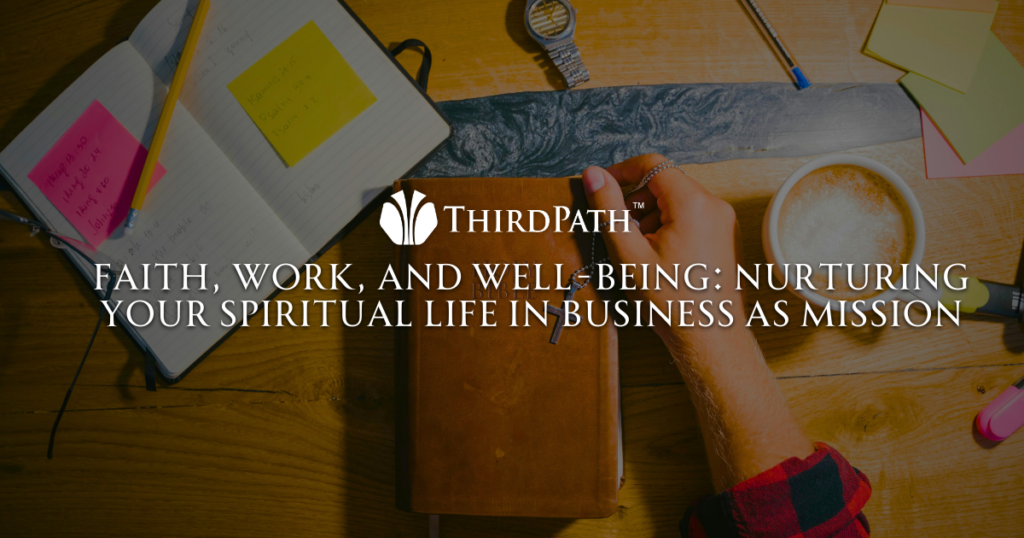
Finding Rest for Your Souls
Keeping Your Spiritual Life Healthy in Business as Mission (BAM)
Introduction Jesus was clear that in following Him, we would find rest for our souls—not exhaustion. Yet, many in the BAM world are exactly that—worn out.
In Business as Mission, it’s easy to get caught up in strategy meetings, deadlines, and the drive to make a tangible impact. However, neglecting spiritual and physical well-being can lead to burnout. Incorporating rest, meditation, and journaling into your daily routine can be a game changer. Here’s why these practices matter and how you can integrate them into your BAM journey.
1. The Power of Regular Rest
Why Rest Matters
In his book Good and Beautiful God, James Bryan Smith highlights the “soul training” of sleep—a simple yet powerful discipline. But rest extends beyond sleep. It includes taking breaks, enjoying leisure time, and stepping away from work stress. Some call this “Sabbath.”
Benefits of Rest:
- Recharges your mental and physical energy.
- Enhances creativity and improves decision-making.
- Reduces stress and prevents burnout.
Practical Ways to Prioritize Rest
- Schedule Breaks: Set alarms for short breaks throughout your day. Even five minutes of deep breathing or stretching can make a difference.
- Power Naps: A 20-minute nap in the afternoon can boost productivity and mood.
- Digital Detox: Set designated times to disconnect from emails and social media. Sabbath means “stop”—learning when and what to stop is crucial for well-being.
2. The Practice of Meditation
Why Meditation is Crucial
Meditation helps quiet the mind, center thoughts, and strengthen resilience in the face of BAM challenges. It allows you to:
- Cultivate mindfulness and mental clarity.
- Enhance emotional resilience in stressful situations.
- Deepen your connection with your mission and faith.
Simple Meditation Techniques
- Breathing Exercises: Inhale deeply, hold, and exhale slowly for five minutes.
- Biblical Meditation: Reflect deeply on a single verse or passage.
- Daily Routine: Meditate at the same time each day to build consistency.
3. Journaling for Spiritual Growth
Why Journaling is Effective
Journaling allows you to process experiences, reflect on challenges, and celebrate wins. Writing prayers can also enhance focus and deepen faith.
Benefits of Journaling:
- Enhances self-awareness and personal growth.
- Provides clarity on goals and obstacles.
- Acts as a spiritual diary, tracking insights and prayers.
Getting Started with Journaling
- Set a Daily Time: Whether morning or night, create a routine.
- Keep It Simple: Write about gratitude, lessons learned, and reflections.
- Use Prompts: Try prompts like “Today I felt…,” “I learned…,” or “I’m grateful for…” to get started.
4. Integrating These Practices into BAM Work
Create a Personal Ritual
A simple daily routine could look like this:
- Morning: Start your day with short meditation and journaling about your intentions.
- Midday: Take a brief rest or power nap to recharge.
- Evening: Reflect on the day and jot down key takeaways.
Make It a Priority
Just as you schedule business meetings, block time for these spiritual practices. Even a few minutes a day can make a significant difference.
Adapt to Your Environment
If you’re traveling frequently or working in different cultural settings, adjust your routine to fit available quiet spaces.
5. The Long-Term Benefits
- Sustainable Leadership: Rest, meditation, and journaling help you stay connected to your purpose and avoid burnout.
- Enhanced Creativity: A well-rested mind is more innovative, allowing for better problem-solving in BAM initiatives.
- Stronger Relationships: A balanced spirit enhances your ability to connect deeply with colleagues and communities.
Conclusion
For BAM professionals, spiritual practices like rest, meditation, and journaling are not just self-care activities—they are essential tools for leadership. These habits provide the foundation to remain resilient, clear, and purpose-driven, ensuring long-term impact in the communities you serve.
Jesus told His disciples to “Come apart.” The truth is, if we don’t come apart, we will come apart. Prioritizing these simple yet powerful practices will help sustain both your mission and your well-being.
